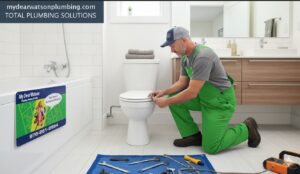Unexpected plumbing issues can turn your home into a stressful environment. Whether you’re dealing with a minor leak or a major pipe burst, understanding common plumbing repairs can help you take swift action. At My Dear Watson Plumbing, Heating & Cooling, we believe in empowering homeowners in Chelmsford, MA, with the knowledge they need to handle plumbing challenges. In this blog post, we’ll delve into seven common plumbing repairs every homeowner should know about and how our skilled plumbing repair team can assist you.

1. Leaking Faucets
In this blog post, we will explore seven common plumbing repairs that every homeowner should be familiar with, as well as how our skilled plumbing repair team can assist you.
Leaky faucets are a common plumbing nuisance and can waste a surprising amount of water—up to 3,000 gallons per year from a single dripping tap, according to the U.S. Environmental Protection Agency (EPA) [source]. But don’t worry, Chelmsford residents; My Dear Watson Plumbing, your local plumbing experts, can easily handle this plumbing hiccup.
Why do faucets leak in the first place? Often, it’s due to worn-out washers or gaskets. These little components may seem insignificant but play a crucial role in keeping your faucet functional and drip-free. Here’s how you can identify and tackle this issue:
- Inspect for visible signs: Look for water pooling around the base or beneath the sink; these are telltale signs of a leak.
- DIY solutions: If you’re feeling handy, you might consider replacing washers yourself. Just make sure to turn off the water supply before you start unscrewing things!
- Call in the professionals: If DIY isn’t your cup of tea or if you’re dealing with more complex issues like the need for pipe replacement, reaching out to an expert can save you time and frustration.
A quick fix saves precious water and lowers your utility bill—a win-win situation! And while you’re addressing that leaky faucet, it might be worth considering other energy-efficient upgrades that My DearWatson Plumbing offers. Curious about eco-friendly options? Check our guide on Earth Day and Eco-Friendly Plumbing Solutions in Massachusetts.
The next time your faucet decides to become an impromptu water feature, remember: it might be small but it’s certainly not trivial. After all, it’s these tiny leaks that eventually create big impacts on both your home and planet.

2. Clogged Drains
Ah, the dreaded clogged drain. Clogged drains are a household nuisance that often go unnoticed until they begin to accumulate water in your sink or shower. At My Dear Watson Plumbing, Heating, and Cooling, we’ve tackled countless clogs over the years, and we’re here to help you understand how to handle this common issue.
Clogs can happen anywhere wastewater flows—bathrooms, kitchens, or utility rooms. A buildup of soap scum, hair, grease, or even rogue objects that have made a wrong turn down the pipes often causes clogs. According to a study by NSF International, kitchen sinks are particularly prone to clogs due to food particles and grease accumulation.
Common Symptoms of Clogged Drains
- Slow Draining Water: If your sink is turning into a mini swimming pool every time you wash the dishes, it’s time for a drain check.
- Unpleasant Odors: A telltale sign of trapped debris decomposing within your pipes.
- Bubbling Sounds: The eerie gurgling noise could mean trapped air due to blockage.
Tackling Clogged Drains
The first line of defense against a clogged drain is prevention. Regular maintenance and mindful disposal practices can significantly reduce occurrences. Here are some tips:
- Use Drain Screens: These handy tools can catch hair and food particles before they head down the drain.
- Please refrain from pouring grease down the drain, as it solidifies in pipes; dispose of it in the trash instead.
- Regular Cleaning: Flush drains with hot water weekly to clear out small build-ups.
If prevention fails, tried-and-true methods like plungers and plumbing snakes can offer relief for minor clogs. However, persistent problems might require professional intervention. When your plumbing issues surpass DIY solutions, our skilled plumbers at My DearWatson are readily available to provide their expertise. Learn more about avoiding common pitfalls with our expert tips on finding the right plumber for your home.
Your drains might be out of sight but don’t let them be out of mind! Addressing clogs promptly helps prevent bigger issues like pipe damage or sewer backups—situations that no homeowner wants to face on a Monday morning before coffee!
If you’re dealing with stubborn clogs or seeking preventative advice from local plumbing experts in Chelmsford, MA, don’t hesitate to reach out to us at My DearWatson Plumbing for fast and reliable solutions.
3. Running Toilets: The Water-Wasting Culprit
Running toilets may seem like the background music of your home, softly gurgling away—until you realize it’s playing a costly tune on your water bill. A running toilet can waste up to 200 gallons of water a day. Yes, that’s right, 200 gallons! That’s a lot of hydration going where it shouldn’t.
Common Causes
- Faulty Flapper: The flapper is the rubber seal at the bottom of the tank that lifts to let water into the bowl. Over time, this little component can wear out or become misaligned, letting water continuously seep into the bowl.
- Float Issues: The float controls how much water fills the tank. If it’s set too high, water will spill into the overflow tube and cause constant running.
- Chain Problems: If the chain connected to the flapper is too long or too short, it can prevent the flapper from sealing properly.
Troubleshooting Tips
If you’re feeling handy and want to tackle this before calling in local plumbing experts, here’s what you might try:
- Check the flapper: Open up your tank and inspect that flapper. Is it closing properly? If not, you might need to adjust or replace it.
- Adjust the float to ensure that the tank stops filling approximately an inch below the top of the overflow tube.
- Address Chain Issues: Make sure the chain has just enough slack to create a snug seal when lowered, but not so much that it catches beneath it.
If these fixes don’t stop your toilet’s endless serenade, it’s probably time to bring in professionals for reliable, affordable plumbing services. Keep in mind, a running toilet not only contributes to noise pollution but also depletes your resources!
Avoiding leaks by addressing issues like running toilets promptly can contribute significantly to more sustainable household operations. For more insights on creating an eco-friendly home in Massachusetts, refer to our article on eco-friendly plumbing solutions.
4. Water Heater Issues
Ah, the water heater—the unsung hero of cozy showers and clean dishes. Until it starts acting up, that is. Whether it’s hissing like an angry cat or dribbling hot water at a rate that would make a baby turtle seem speedy, water heater issues are one of those common plumbing repair services scenarios every homeowner should be familiar with.
The Cold Truth About Water Heaters
- Lack of Hot Water: This is the most obvious sign of trouble and can stem from several issues such as a faulty thermostat or heating element. If you’ve ever encountered the sudden shock of a cold shower, you’ll comprehend the urgency of this situation.
- Strange Noises: If your water heater sounds like it’s auditioning for a horror movie with bangs, pops, and crackles, sediment buildup might be to blame. This accumulation can cause inefficiency and shorten your heater’s lifespan.
- Leaks: Are puddles forming around your water heater? It’s more than just a slip hazard; it can indicate serious problems like corrosion or failing components.
- Discolored Water: Rusty or murky water could mean your tank is corroding from the inside out – not quite what you want in your morning coffee.
Energize with Efficiency
Consider switching to more energy-efficient options if your trusty tank appears to be nearing its end. According to the U.S. Department of Energy, upgrading to high-efficiency models can reduce heating costs by up to 50%. Plus, exploring tankless options or hybrid heat pump models may provide long-term savings while being kinder to Mother Earth.
Need immediate assistance? Don’t let water heater woes leave you in hot (or rather tepid) water. Reach out to our local plumbing experts, who are ready with timely solutions and unmatched expertise—because nobody deserves lukewarm showers on their watch!
5. Low Water Pressure
Ah, the frustrating phenomenon of low water pressure—a plight that can turn a refreshing shower into a trickling disappointment. Not only is it an inconvenience, but it might also be a sign that your plumbing system needs some TLC. Rest assured, by comprehending the common causes, you can effectively handle this issue.
Common Causes of Low Water Pressure
- Clogged Pipes: Over time, mineral deposits and debris can accumulate in your pipes, restricting water flow.
- Leaky Pipes: A sneaky leak can significantly decrease water pressure throughout your home.
- Faulty Fixtures: Sometimes the culprit is as simple as a clogged or malfunctioning faucet or showerhead.
- Main Line Issues: Problems with the municipal water supply line or your home’s main line can also lead to reduced pressure.
What You Can Do
If you’re experiencing low water pressure, there are several steps you can take before calling in the cavalry (a.k.a. your local plumbing experts at My Dear Watson):
- Check All Fixtures: Determine if the problem is widespread or isolated to one fixture. This will help identify if it’s an issue with that specific fixture or something more systemic.
- Inspect for Leaks: Check visible pipes for any signs of leaks and listen for dripping sounds. Even minor leaks can impact pressure significantly.
- Clean Fixtures: Unscrew faucet aerators and showerheads to clean out any sediment buildup that could be causing blockages.
- Consult a Professional: If these steps don’t resolve your issue, it may be time to bring in professionals who have the tools and expertise to tackle more complex problems such as pipe corrosion or pressure regulator failures.
The key takeaway is not to ignore low water pressure—what seems like an inconvenience could be indicative of larger plumbing issues waiting to arise. Addressing it promptly restores your home’s functionality and helpse costly repairs.
If you’re interested in learning more about eco-friendly ways to maintain your plumbing system while maximizing efficiency, check out our article on eco-friendly plumbing solutions in Massachusetts.
No one should have to deal with subpar showers and sluggish sinks! With these tips—and our expert help just a call away—you’ll be back to enjoying strong water flow in no time.
6. Burst Pipes
Ah, burst pipes—a homeowner’s dreaded surprise package! These unwelcomThese unwelcome guests typically arrive during the coldest winter days or after a long absence, when no one is around to greet them. issue can mitigate potential damages and save you a significant headache.
Why Do Pipes Burst?
- Freezing Temperatures: One of the leading causes of burst pipes is freezing temperatures. When water inside the pipes freezes, it expands, exerting immense pressure that can cause the pipe to rupture.
- Old Pipes: Over time, pipes corrode and weaken, making them more susceptible to bursts.
- High Water Pressure: Consistently high water pressure can strain pipes beyond their limits, leading to bursts.
Immediate Steps to Take
If you suspect a burst pipe, swift action is your best ally. Here are the steps you are encouraged to take right away:
- Turn off the water supply by locating your main water valve and shutting it off to prevent flooding.
- Drain Your Faucets: Open all taps in your home to allow any remaining water in the system to escape and reduce further pressure on the pipes.
- Call a Professional: At this point, it’s crucial to reach out to local plumbing experts like My Dear Watson Plumbing for emergency plumbing repair services. You can contact us for rapid response times and expert handling of such situations.
Avoidance Measures: Better Safe Than Sorry!
- Insulate Pipes: Ensure that exposed pipes are insulated well, especially those in unheated areas like basements or attics.
- Maintain Regular Maintenance: Routine plumbing maintenance services can identify potential problems before they escalate into full-blown emergencies.
- Avoid Cranking Up Thermostats: It might seem counterintuitive, but keeping heating at a consistent temperature rather than cranking it up sporadically helps maintain even warmth around your pipes.
Burst pipes can indeed feel like an unwelcome plot twist in your cozy home narrative. However, with proper prevention measures and timely actions—like having our expert team on standby—you can turn this villain into yet another chapter conquered with ease. Learn more about ensuring your plumbing is winter-ready by checking out our tips on eco-friendly plumbing solutions over at our blog.
The key takeaway? AlwaysWhat is the most important lesson to remember?ecause when it comes toWhen dealing with burst pipes, keep in mind that the goal is not to completely avoid leaks, but to be prepared for when they occur!
Ah, sewer lines—the not-so-glamorous backbone of your plumbing system. While they may not be the first thing you think about when considering plumbing repair services, they are certainly crucial for the smooth operation of any home or business in Chelmsford, MA. If you’re experiencing repeated blockages or unpleasant odors wafting through your property, it might be time to address these underground heroes.
The Common Culprits
- Tree Roots: In their eternal quest for water, tree roots can penetrate sewer lines and cause significant blockages. Picture them as nature’s plumbers—only they work against you!
- Sediment Build-up: Over time, mineral deposits and other debris can accumulate inside your pipes, diminishing their effective diameter and slowing down drainage.
- Poor Installation: Occasionally it’s not what you did but what others before you didn’t do right. Misaligned pipes can lead to repeated clogs and even breaks.
Signs You Might Have Sewer Line Issues
- A gurgling toilet—sounds funny but indicates air in the system.
- Sewage backup in drains or toilets—this is a red alert!
- Lush patches of grass in the yard—a swampy oasis—often signal leaking sewage underneath.
Solutions and Services
Tackling these issues isn’t a DIY affair; it requires professional expertise—like that offered by our local plumbing experts at My DearWatson Plumbing, Heating & Cooling. Here are some effective solutions we employ:
- Video Camera Pipe Inspection Services:
- for Pipes: A high-pressure stream that clears even the toughest sediment buildup without damaging your pipes.
- Trenchless Pipe Repair: This minimally invasive technique restores functionality without turning your garden into a construction zone.
If these signs sound allIf you recognize these signs, don’t let a minor inconvenience escalate into a plumbing crisis. with timely interventions from professionals who understand the intricacies of both residential and commercial plumbing repair challenges. For more insights on maintaining a healthy plumbing ecosystem, check out our post on signs you need new systems.
Your sewer line may not top the list of fascinating dinner party topics, but ensuring its health guarantees peace of mind—and fewer “Oh no” moments during family gatherings!
Tackling these common plumbing repairs promptly can save homeowners from more complex and costly issues down the line. At My Dear Watson Plumbing, Heating & Cooling, we offer reliable residential plumbing services tailored to meet your specific needs in Chelmsford, MA. Whether you’re facing an emergency or require routine maintenance, our local plumbing experts are here to help with affordable plumbing solutions that guarantee satisfaction every time.
FAQ
Q: What are the 7 most common plumbing problems every homeowner should know?
A: The 7 most common plumbing problems every homeowner typically faces include dripping faucets, running toilets, clogged drains, water heater issues, burst pipes, sewer line backups, and leaky pipes. Understanding these issues can help in basic plumbing maintenance and deciding when to call a plumber.
Q: How can a dripping faucet affect my water bill?
A: A dripping faucet can waste hundreds of gallons of water each day, leading to a significant increase in your water bill. Addressing this common plumbing issue quickly can help keep your home’s utility bills in check.
Q: What are some DIY plumbing fixes I can handle as a homeowner?
A: Homeowners can often manage basic plumbing maintenance tasks like leaky faucet repair, running toilet fixes, and clogged drain solutions. However, for more complex issues, it’s wise to know when to call a plumber.
Q: When should I consider a professional plumber for plumbing repairs?
A: If you encounter significant water damage, a burst pipe, or a sewer line backup, a professional is the best option. While some common plumbing issues can be resolved DIY, others require expert assessment and repair.
Q: What steps should I take for emergency plumbing tips?
A: In an emergency, first shut off the main water supply, assess the situation, and identify the problem. If it’s a burst pipe or severe leak, calling a professional plumber is essential to prevent further damage.
Q: How can I keep my plumbing system running smoothly?
A: To keep your plumbing system in top condition, regularly inspect for leaks, perform basic plumbing maintenance tasks, and be proactive about addressing common plumbing problems before they escalate.
Q: What is the best way to handle water heater repair?
A: For water heater repair, start with basic troubleshooting like checking the thermostat and ensuring it’s receiving power. We recommend contacting a professional plumber if problems persist, particularly for complex issues.
Q: What should I know about burst pipe repair?
A: Burst pipe repair involves quickly shutting off the main water supply to prevent flooding and water damage. It’s often best to call a professional plumber for this issue to ensure proper and safe repair.
Q: What are common plumbing issues that can lead to water damage?
A: Common plumbing issues that can lead to water damage include leaky faucets, running toilets, and burst pipes. Regular maintenance and timely repairs can help prevent these problems and protect your home.
Q: Can I fix a leaky faucet myself?
Yes! Most leaky faucets are due to worn-out washers or cartridges. With the right tools and a quick YouTube tutorial, it’s a manageable DIY job.
Q: When should I call a plumber for a clogged drain?
If plunging or snaking doesn’t work—or if multiple drains are clogged—you should call a professional. This could indicate a deeper blockage or sewer line issue.
Q: Why is my water pressure suddenly low?
Low water pressure can be caused by mineral buildup, a hidden leak, or municipal supply issues. If basic cleaning doesn’t help, a plumber can diagnose the source.
Q: What are signs my water heater needs repair?
Look for inconsistent water temperature, strange noises, or rusty water. These signs usually point to sediment buildup or a failing heating element.
Q: How can I prevent frozen pipes?
Insulate pipes in unheated areas, let faucets drip in freezing weather, and keep your home above 55°F. If you’re away during winter, shut off the main water supply and drain the lines.
Q: What causes sewer line backups?
Tree roots, grease buildup, or collapsed pipes are common causes. If you observe gurgling drains, water backing up, or unpleasant odors, please contact a plumber promptly.






